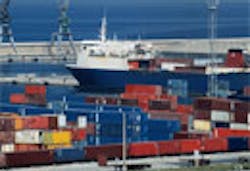Judge clears way for L.A. Clean Truck Program; ATA to appeal
A federal judge in Los Angeles late last week ruled that the Clean Trucks Program at the Port of Los Angeles can proceed, rejecting the American Trucking Assns. (ATA) contention that a provision in the program violates federal law.
“ATA received the decision of the U.S. District Court for the Central District of California [Thursday] night,” the association said in a statement. “We are disappointed with the decision, and believe it is clearly erroneous as a matter of law. ATA intends to appeal it.
“ATA further intends to ask the courts to maintain the legal status quo – that is, to keep in place the injunction against the ban on independent owner-operators, off-street parking, and other provisions – until the Court of Appeals has the opportunity to review the case,” ATA added. “Inasmuch as all parties agreed at trial that the benefits of the clean truck and clean air elements of the Clean Trucks Plan have been fully realized with the injunction in place, neither the port nor the people of California have been harmed by the preliminary injunction, and we hope that request will be granted.”
Read the full ruling here.
Federal Judge Christina Snyder ruled the Port does have the legal right to institute its program, which would require older-model trucks to be phased out of operation at the port. As part of the program, more than 16,000 trucks need to be retrofitted or replaced within five years to meet the clean air goals of the Port.
Specifically, the judge ruled that “the provisions of the Concession Agreement at issue do not constitute an undue burden on interstate commerce” and that they do not “constitute an unreasonable burden on interstate commerce.”
“We are extremely pleased that our concession program was upheld by the court ruling, including accountability of motor carriers,” said Geraldine Knatz, executive director of the Port of Los Angeles in a statement. “Our ability to have direct enforcement of the truck bans and other important features of our concession agreements with the trucking companies that call at the Port of Los Angeles thousands of times a day will help provide a safer and secure trucking system for the long term.”
To meet that goal, the Port of Los Angeles requires any driver going into or out of the port to be employed by a trucking company – effectively eliminating owner-operators from operating at the ports – no later than Dec. 31, 2013. ATA, while in favor of the Clean Truck Program as whole, objected to this provision and sued in 2008. An appeals court initially ruled in ATA’s favor, and sent the suit to Snyder’s courtroom.
ATA initially sued the ports of Los Angeles and Long Beach, but the suit against Long Beach was dropped when that port agreed to drop is employee requirement.
ATA believes the employee mandate violates federal law that prevents state and local governments from instituting regulations that could restrict interstate commerce. Snyder ruled that Los Angeles has a legal right to implement rules that affect air quality and to do that , the employee portion was reasonable.
“This decision is evidence that we are making real progress on growing and greening our Port,” said L.A. Mayor Antonio Villaraigosa. “Now we can finally move forward with our Clean Truck Program, a model for ports around the nation.”
U.S. Rep. Jerrold Nadler (D-NY) introduced the Clean Ports Act of 2010 (H.R. 5967), which would amend the Federal Motor Carrier Act to allow individual ports to enact and enforce clean-truck programs beyond current federal guidelines. The bill has been referred to the House Transportation and Infrastructure Committee.
The bill would empower individual ports to enact programs such as Los Angeles’.
“With trucking a ubiquitous and central part of goods distribution nationwide, we must ensure that the government is doing everything in its power to decrease vehicle emissions and minimize pollution in and around our ports,” said Nadler. “The Clean Ports Act will update federal environmental law to allow forward-thinking ports, like the Port of Los Angeles, to implement clean truck programs that will improve the air, empower truckers, and reduce the incidence of illnesses exacerbated by pollution.”
The Natural Resources Defense Council (NRDC) filed a brief in the lawsuit supporting the program, and was pleased with last week’s decision.
“This victory bolsters the standing of burgeoning clean port programs across the nation,” said Melissa Lin Perrella, senior attorney with NRDC’s Southern California Air Program. “Millions of people live in port communities across the country and are forced to subsidize the operations of outdated port operations with their lungs. This decision allows the Port of Los Angeles to continue introducing cleaner trucks while getting dirty ones off the road and sets the stage for healthier communities nationwide.”
